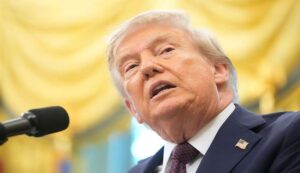Trump’s trade war reaches the Supreme Court
Following a lower court’s decision to invalidate the majority of the levies that have been at the heart of the Republican president’s economic and trade agenda, Donald Trump’s administration requested on Wednesday that the U.S. Supreme Court expeditiously consider a bid to maintain his expansive tariffs, which were pursued under a 1977 law intended for emergencies.

Undermining a key Trump aim in his second term, the Justice Department challenged a federal appeals court’s August 29 decision that the president had overreached himself in using the International Emergency Economic Powers Act.
By determining whether to take up the issue by September 10 and conducting arguments in November, the government requested that the court expedite its assessment. October 6 marks the start of the court’s new term.
“The stakes in this case could not be higher,” said Solicitor General D. John Sauer in a document.
“The President and his cabinet officials have determined that the tariffs are promoting peace and unprecedented economic prosperity, and that the denial of tariff authority would expose our nation to trade retaliation without effective defenses and thrust America back to the brink of economic catastrophe,” said Sauer.
The government’s request for a Supreme Court hearing is not being opposed by attorneys representing small firms contesting the tariffs. In a statement, one of the lawyers, Jeffrey Schwab of the Liberty Justice Center, expressed confidence that they would win.
“The viability of small enterprises is being seriously threatened by these illegal levies. For the sake of our customers, we hope this lawsuit is resolved quickly,” Schwab said.
The taxes are a component of a trade war that Trump has been waging since taking office again in January, which has strained relations with trading partners, raised financial market volatility, and stoked economic uncertainty throughout the world.
Tariffs have been a cornerstone of U.S. foreign policy under Trump, who has used them to renegotiate trade agreements, impose political pressure, and demand concessions from nations that sell products to the US.
The lawsuit focuses on Trump’s use of IEEPA to impose separate duties announced in February as economic pressure on China, Canada, and Mexico to stop the trafficking of illegal narcotics and fentanyl into the United States, as well as what Trump claims are “reciprocal” tariffs to fix trade imbalances in April.
IEEPA, which has previously been used to freeze the assets of adversaries or impose penalties on them, grants the president the authority to deal with “an unusual and extraordinary threat” during a national emergency. Tariffs had never been imposed under the law until Trump.
According to Trump’s Department of Justice, the statute permits tariffs under emergency clauses that give the president the power to “regulate” or outright ban imports.
The appeals court’s decision is the result of two challenges. One was filed by five small import-related firms, including a sport fishing outlet in Pennsylvania and a wine and spirits importer in New York. Twelve U.S. states—most of which are run by Democrats—filed the other, including Arizona, Colorado, Connecticut, Delaware, Illinois, Maine, Minnesota, Nevada, New Mexico, New York, Oregon, and Vermont.
According to the cases, Congress, not the president, is given the power to impose taxes and tariffs under the Constitution, and any transfer of that power must be clear and constrained.
The Washington, D.C.-based U.S. Court of Appeals for the Federal Circuit concurred, holding that the president’s legal authority to control imports excludes the authority to levy tariffs.
In its 7-4 ruling, the appeals court said that it was “unlikely that Congress intended, in enacting IEEPA, to depart from its past practice and grant the President unlimited authority to impose tariffs.”
The Supreme Court’s “major questions” concept, which mandates that executive branch acts of significant economic and political importance be expressly approved by Congress, is likewise violated by the administration’s sweeping interpretation of IEEPA, the appeals court found.
In a statement submitted with the Justice Department’s appeal, Treasury Secretary Scott Bessent stressed the need for the Supreme Court to act swiftly, claiming that the ruling of the appeals court compromises Trump’s capacity to “conduct real-world diplomacy and his ability to protect the national security and economy of the United States.”
Trump’s tariff plans were earlier overturned on May 28 by the U.S. Court of International Trade, located in New York and with authority over customs and trade disputes.
The administration has also challenged the Washington court’s ruling that Trump’s tariffs are not permitted under IEEPA. Trump’s tariff policies have been the subject of at least eight lawsuits, including one from the state of California.
The administration’s appeal coincides with a legal battle against the Federal Reserve’s independence that seems headed to the Supreme Court, perhaps leading to a court battle over Trump’s whole economic strategy in the coming months.